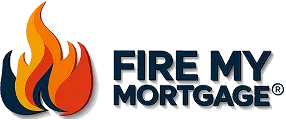
Take Control of Your Financial Future
Personalized Coaching
Education
Proven Debt Solutions
Our Signature
Debt Acceleration Strategy
Once your foundation is set, we introduce advanced tools- like our Zero Debt Strategy (ZDS)- that can help you pay off your mortgage & other debts in as little as 5-7 years, without refinancing or sacrificing your lifestyle.

Works with FHA, VA, Conventional, USDA, & Adjustable-Rate Mortgages

Outperforms traditional "extra payment" & bi-weekly strategies

Proven, safe, & transparent-no gimmicks, just results



ABOUT US
Fire My Mortgage®
We're Fire My Mortgage®. Our vision is to help everyday families like yours break free from financial headaches for good. Through practical education, expert coaching, & a suite of proven strategies, we empower homeowners to take control of their money, eliminate debt, & build lasting financial security. From budgeting & cash flow analysis to ongoing support and advanced mortgage payoff methods, we're here every step of the way. Join the movement let us show you how to become debt free & take control of your financial future!
Tailored Mortgage Solutions
Expertise You Can Trust
20+ YEARS EXPERIENCE
HOW WE HELP
Comprehensive Financial Coaching

Personalized
Budgeting
We help you create a budget that fits your life and goals—without feeling restricted.

Cash Flow
Analysis
Understand where your money
goes & how to make every dollar
work harder for you.

Financial
Education
Learn smart money management & debt elimination to make confident financial decisions

Ongoing
Support
We’re with you every step, from your first analysis to your final debt payoff.
Success Stories
Real Client Real Results

"We paid off our 30-year mortgage in just 6 years. It almost felt too good to be true—until it happened!"

Amy & Tim

"We’re now debt free, and it’s all thanks to the Fire My Mortgage team."

Carolyn & Lonnie

"The coaching and support made all the difference. We recommend this to everyone!"

Jim & Teresa
See the Big Picture
Here’s how your journey looks—from struggle to legacy.

Step 1: See Where You Stand
Shift your money mindset and get a clear snapshot of your money. — Analyze income/expenses, identify leaks, and set your intention.

Step 2: Find Your Why
Find your “why” and set a purpose for your finances. — Clarify your goals, values, and financial starting point.

Step 3: Discover the Faster Debt Payoff Plan Around
Learn the proven strategy to crush your debt in record time with no refinancing and no major sacrifices required. — Understand the Zero Debt Strategy method, and set up your plan.

Step 4: Ignite Your Personalized Payoff Journey
Take action with a stepbystep guide to pay off all your debt (including your mortgage). — Apply new money management techniques, automate, and track progress.

Step 5: Build Your Wealth Safety Net
Protect yourself from life’s curveballs and start investing for a future you can count on.
— Fund emergency plans, college tuition and investments.

Step 6: Multiply Your Money (10x)
Unlock advanced tools and strategies to grow your wealth faster. — Explore real estate investing, business, and other wealth multipliers.

Step 7: Leave Your Mark
Create a lasting impact that helps your family, supports causes you believe in and inspires others. — Plan your legacy, give generously, and mentor others.

Our Process

Start with a Free
Analysis
We assess your finances to find the best path forward


Build Your
Personal Plan
We create a clear plan for your budget, cash flow, & debt


Get Expert
Coaching
We guide you through each step with answers and support


Accelerate Your Progress
We introduce advanced strategies to speed up your debt payoff


Celebrate Financial Freedom!
We introduce advanced strategies to speed up your debt payoff
Frequently asked questions
Everything you need to know about Fire My Mortgage®
How is Fire My Mortgage® different from refinancing or making extra payments?
We use a holistic approach—combining education, budgeting, cash flow management, and advanced payoff strategies—to help you save more, faster, and with less risk.
Is this strategy safe for my family?
Absolutely. Our methods are based on time‐tested financial principles and tailored to your unique situation.
We never recommend risky or unproven tactics.
What if I have bad credit or little equity?
We have solutions for all credit and equity levels, including alternative strategies and coaching to help you
qualify for more advanced methods down the road.
Does this work for all mortgage types?
Yes! We work with FHA, VA, Conventional, USDA, and Adjustable‐Rate Mortgages.
What does the coaching process look like?
You’ll get one‐on‐one support, clear action steps, and ongoing education—so you’re never alone on your journey to debt freedom.
Contact Us
Contact us today to discuss how we can help you achieve your Mortgage goals with expert guidance.
402‐939-6957 or 888-968-FIRE
Serving all 50 states
from Omaha, NE
Disclaimer:
Disclaimer: Fire My Mortgage® does not provide legal, tax, or investment advice. Please consult with licensed professionals before implementing any financial strategy. Results may vary based on individual circumstances.
Fire My Mortgage® | Empowering Financial Freedom. Building Community. Inspiring Change.
© 2025 Fire My Mortgage®. All rights reserved.